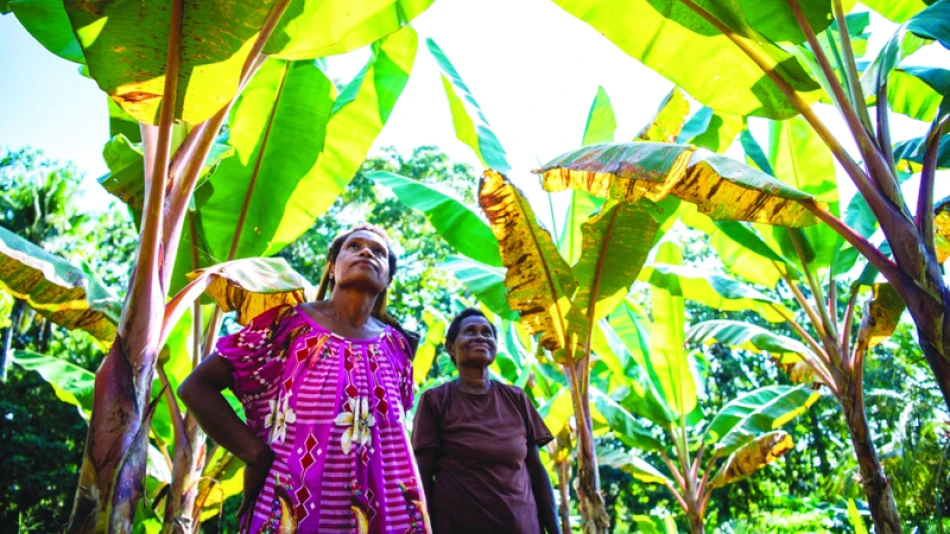
Empowered Women of Papua New Guinea Break Silence on Violence, Driving Impactful Change
Papua New Guinea's Quiet Revolution: How Women Are Breaking the Cycle of Violence Through Sports and Community Action
In a nation where two-thirds of women face violence during their lifetimes, grassroots female activists in Papua New Guinea are pioneering an unconventional approach to social change. Using sports, dialogue, and education as their weapons of choice, these women are challenging deeply entrenched cultural norms and creating ripple effects that could reshape one of the world's most dangerous places for women.
When Survival Becomes Activism
Tahina Booth's transformation from rape survivor to social revolutionary illustrates the power of personal trauma channeled into systemic change. Assaulted at age seven, Booth spent decades grappling with fundamental questions about normalized violence in her society. Her answer came through sport—specifically through her "Grass Skirt" program, which uses athletic activities to teach conflict resolution, gender equality, and leadership skills to young people across Papua New Guinea's most volatile regions.
The timing of such initiatives couldn't be more critical. Earlier this year, the murders of two women in separate incidents triggered widespread civil unrest, forcing the government to confront what Prime Minister James Marape has termed an "epidemic" of gender-based violence. This public awakening represents a potential turning point for a nation approaching its 50th independence anniversary with soul-searching questions about its social fabric.
The Anatomy of a Crisis
Papua New Guinea's violence statistics paint a stark picture that extends far beyond domestic abuse. The crisis encompasses sexual violence, family disputes, and killings linked to sorcery accusations—all woven into what human rights activist Ruth Kissam describes as the country's social DNA. The underreporting of incidents, driven by fear of retaliation and distrust in justice systems, means the true scope likely exceeds official figures.
This systematic failure creates a vicious cycle where violence becomes normalized across generations. Unlike other Pacific nations that have made progress on gender equality, Papua New Guinea's tribal structures and geographic isolation have preserved traditional power dynamics that often disadvantage women.
Grassroots Innovation in Remote Communities
In Morobe Province's coastal regions, community mediator "B Oo" has created an informal but effective support network for abuse survivors. Operating without legal training or police authority, this mother and violence survivor has become a first responder for women in crisis—documenting testimonies, counseling couples, and providing emergency shelter.
Her success metrics are measured in behavioral shifts: children now speak openly about abuse and demand their parents stop fighting, while village leaders actively contact her when incidents occur. Despite receiving no compensation and often running out of phone credit, Oo continues her work, driven by the belief that "people are changing" as they begin to understand that violence violates both law and basic human dignity.
The Economic Dimension of Peace
In conflict-torn Hela Province, local council member Maureen Mukay has pioneered what she calls a "Peace Program" that addresses violence through economic empowerment. Her workshops teach displaced women and men practical skills including agriculture, sewing, and financial management—creating what she describes as "a sense of purpose" that reduces violence levels.
This approach recognizes that sustainable peace requires economic stability. When families can feed themselves and manage their finances, domestic tensions decrease. Mukay's model demonstrates how addressing root causes of stress and powerlessness can be more effective than traditional law enforcement approaches.
Government Awakening and Systemic Challenges
The political establishment's recent acknowledgment of the crisis represents a significant shift. Prime Minister Marape's characterization of gender-based violence as an "epidemic" and Deputy Prime Minister John Rosso's calls for male accountability signal growing official recognition that existing approaches have failed.
However, the gap between policy and implementation remains vast. While Papua New Guinea has laws protecting women and children, enforcement is sporadic and support services are severely limited. The country's challenging geography, limited infrastructure, and resource constraints make it difficult to extend urban-based services to remote communities where much of the population lives.
Regional Context and Global Implications
Papua New Guinea's struggles stand in stark contrast to neighboring Pacific nations like Fiji and Samoa, which have made significant progress on gender equality through sustained government commitment and international partnerships. The country's approach of relying heavily on grassroots activism while building institutional capacity mirrors strategies used in post-conflict societies like Rwanda and Colombia.
For international development organizations and donors, Papua New Guinea represents both a challenge and an opportunity. The success of programs like Booth's "Grass Skirt" initiative and Mukay's "Peace Program" suggests that locally-designed, culturally-appropriate interventions can achieve results where top-down approaches have failed.
The Path Forward
The convergence of grassroots activism, political acknowledgment, and approaching national milestone creates unprecedented momentum for change. Booth's ambitious goal of reaching one million people by 2050 reflects the scale of transformation these activists envision—a Papua New Guinea where girls can play freely and boys can express emotions without shame.
The success of these efforts will likely depend on sustaining community-level engagement while building institutional support systems. As Papua New Guinea approaches its independence semicentennial, the question is whether the country can harness this grassroots energy to create lasting structural change, or whether these inspiring individual efforts will remain isolated bright spots in an otherwise unchanged landscape.
The women leading this quiet revolution understand that transformation happens one conversation, one sports program, and one changed mind at a time. Their work suggests that even in societies where violence seems intractable, determined individuals can plant seeds of change that eventually reshape entire communities.
Most Viewed News

 Sara Khaled
Sara Khaled






